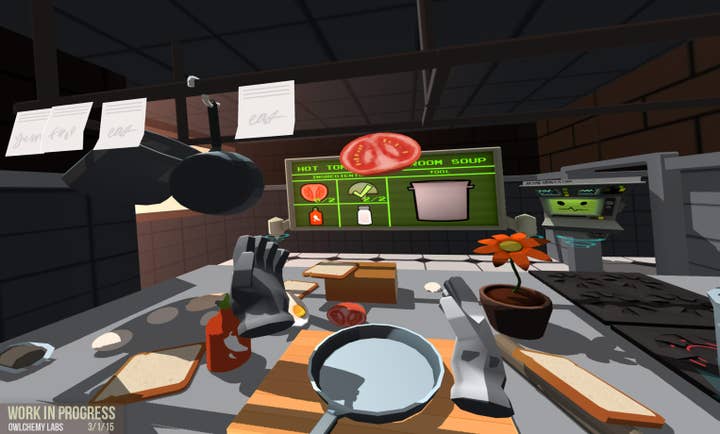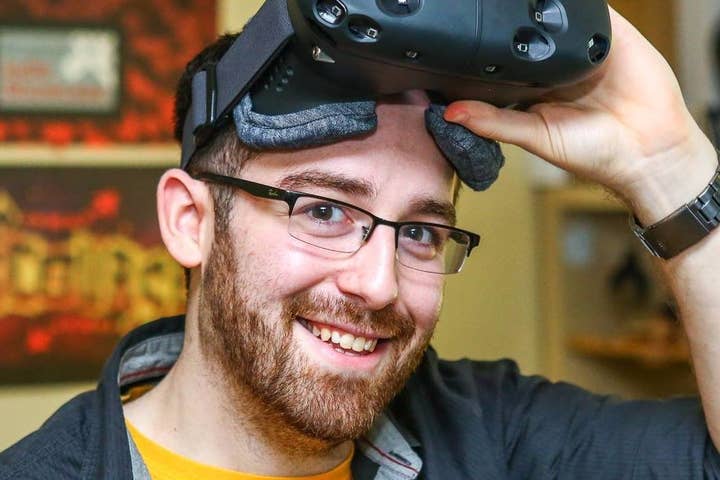Owlchemy bets it owl on VR
Co-founder Alex Schwartz says the Job Simulator studio may have made its last game for 2D monitors
Owlchemy Labs' Alex Schwartz is sold on virtual reality, and it's not hard to see why. The studio co-founder told GamesIndustry.biz his four-person team's first foray with the tech, a VR version of its base-jumping game AaaaaAAaaaAAAaaAAAAaAAAAA!!! for the Awesome, was the most downloaded game on the Oculus Share developer site for more than a year.
"Obviously we're selling only to developers and enthusiasts, but it garnered a lot of interest and brought us into a space where now, we're realizing that our latest release, Dyscourse (which just came out on Steam), might have been our last game created for 2D monitors. We've kind of made that choice to move solely into the VR space."
"[O]ur latest release, Dyscourse, might have been our last game created for 2D monitors."
Owlchemy's upcoming game, Job Simulator, was designed exclusively for VR systems with hand-tracking capabilities, and served as a showpiece for Valve during its HTC Vive hands-on demos at the Game Developers Conference. In a future where robots handle all the tasks that need doing, humans can cling to the dim memory of what it was actually like to work through computer-created simulations of now obsolete professions. Fortunately those simulations don't quite "get" the jobs they're attempting to replicate, which gives the exercise an absurd sense of humor.
Creating Job Simulator with VR in mind meant rethinking some of the most basic assumptions game designers have had for decades, Schwartz said. For example, movement. Up until now, moving around in games meant pushing a joystick in a certain direction, or holding down keys and moving a mouse. But there's a certain portion of the player population who find that sort of movement sickness inducing in VR. But thanks to room-scale VR and tracking technology, Owlchemy was able to have all the movement in Job Simulator directly controlled by the player.
"If you're porting an old IP, of course you've probably baked locomotion into your game design," Schwartz said. "You move around the space, that's how it works on a 2D monitor. That's why we need to build from the ground up with other types of locomotion in mind. Just holding forward on the stick is not a good way to go, I think.
"You can always port, and some games will port better than others, but I think the real compelling content is going to come out of games designed from the ground up with this hardware in mind. There are genres of games that haven't been invented yet that will only work in VR. And we're never going to get there and explore that design space by porting existing games."

While every development studio and its parent company seems to have been exploring VR possibilities for the past couple years, it's that sort of commitment to making the most of the technology--even if it means leaving behind gamers without VR headsets--that Schwartz believes will give Owlchemy an edge.
"I'm pretty confident that quality launch titles that are fully featured... we'll still be among the very few who will have put in the time, effort, and get to the polish level of feeling like this is a launch title, versus a tiny tech demo," Schwartz said. "So yeah, I do feel like the first mover advantage is alive and well for VR, especially on the platforms that require more proprietary hardware and prior existing relationships with that company."
As Schwartz explained, Owlchemy's investment in VR isn't just an investment in the tech. It's been an investment in those relationships as well. Job Simulator gave Valve a highlight for its Vive coming out party, and Owlchemy has also been helping Valve with its outreach in the development community. Last year, Valve hosted the Boston VR Bender, a weekend-long game jam organized in conjunction with Valve to give developers their first taste of developing with the company's positional tracking technology. The studio followed that up by organizing the first-ever Vive Room-Scale VR Jam, set to take place in Austin this weekend with the cooperation of Valve, HTC, Nvidia, Unity, and Epic. (As of this writing, the attendee list includes people from Cloud Imperium, Sledgehammer, Certain Affinity, Battlecry, Hi-Rez Studios, Kingsisle, and dozens more.)
"You have to be a certain kind of crazy to be developing a VR-only game in 2015."
"You're either spending money on R&D and hoping for the best, or in our case, we've been positioning ourselves over the past two years to building content that didn't necessarily need to make money for us so that we can be known as top VR developers to folks like Valve, HTC, and everyone involved here," Schwartz said.
As exciting as the VR space is, Schwartz acknowledges it's just as volatile, with plenty of good reasons for developers to give pause. There aren't many consumer products out there to validate it. The big players are still talking about launch windows instead of launch dates, and it's tough to project unit sales with any confidence when some key information like price points still haven't been announced yet.
"You have to be a certain kind of crazy to be developing a VR-only game in 2015," Schwartz said. "And I would make sure that you knew you had close relationships with those partners and are looking toward launch titles. Otherwise you're definitely building for a very small market. But I would say to avoid VR at this point, or to naysay its ability to become a thing, is quickly becoming a luddite's view of things. It's pretty obvious that VR is here to stay. And it's up to the amount of risk you're willing to take at this point. The risk will be way lower if you start developing Q1 or Q2 next year."
Of course, waiting will put developers at the very beginning of the learning curve for VR development, but perhaps not that much. Schwartz noted that Owlchemy Labs has just two years of experience working with VR, "which hilariously makes us veterans in the space."
"It's really exciting to be in a space where your preconceived notions and expectations of what will happen when you implement something and then try it are almost completely wrong every time you try it," Schwartz said. "It just means we're in such a weird, early, fertile design space."
For any latecomers to the scene, Schwartz said catching up is just a matter of how fast they can prototype a feature, fail, and iterate on it. There's very little in the way of rules about the best way to do things in VR, as Schwartz discovered in Oculus' own practical tech guide of do's and don'ts for developers.
"No matter how good we make the hardware and how great the optics are and framerate is, a developer can undo all of that work in one shitty line of code."
"It's mostly don'ts. 'Don't do this or it'll make you sick. Don't do that or it'll make you sick.' We at least can prove that," Schwartz said. "But as far as, 'Here's the best way to do X,' no one knows. No one knows, so we keep finding OK ways to reinvent certain wheels and are realizing that old paradigms like HUD and user interface need to be thrown out completely."
Oculus' Palmer Luckey has said "really bad VR is the only thing that can kill off VR," emphasizing the importance of people's first experiences with the tech begin good ones. Schwartz agreed completely with the idea, noting that the problem goes beyond simply having good hardware and good software.
"I think curation is very important to maintaining quality in the VR space," Schwartz said. "So I would hope that any platform or portal that allowed games on it would vet content for things that are unacceptable within VR, for example spinning the player's camera around and inducing nausea. No matter how good we make the hardware and how great the optics are and framerate is, a developer can undo all of that work in one shitty line of code. So I think you need a solid support system of being able to rate and judge content from a comfort standpoint, but make sure you don't have a ton of people unknowingly downloading something only a minority of the population will find comfortable. You don't want the equivalent of an unvetted Android app that ends up deleting your entire hard drive."
Still, Schwartz is optimistic that these problems can be solved, or at least addressed enough to let VR realize its potential as the "next big thing." Reassuringly, he also sees a lot of similarities to the last big thing.
"It's a new world. We're seeing a huge shift in the industry," Schwartz said. "I'm seeing a lot of parallels to what happened about eight years ago at the start of the iPhone revolution when a lot of my AAA buddies, a lot of folks at big studios were quitting to go work at tiny mobile startups. And everyone thought they were insane. And then there was more and more VC money being put into mobile freemium games, and mobile became the biggest market of all time. I'm seeing the same thing happen with VR, starting about 12 months ago. We're definitely at the crook in the hockey stick curve of things exploding when it comes to consumers and VR."

